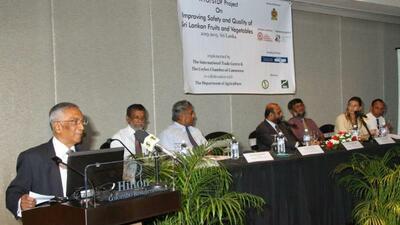ITC’s Modular Learning System in Supply Chain Management - Global professional Training and Certification for Greater Competitiveness
In a market where customers are more demanding than ever and resources are scarce, achieving excellence in the supply chain is increasingly challenging. With the mandate to provide technical cooperation in the area of international trade promotion and development, ITC has developed a Modular Learning System in Supply Chain Management (MLS-SCM)Ⓟ.
The MLS-SCMⓅ includes a series of 18 high-quality and up-to-date training packs covering all stages of supply chain management to help companies achieve greater competitiveness. A global professional certification programme with exams managed by ITC is also offered. The programme was launched in 2000 and, so far, more than 25,000 professionals in 61 countries have benefited from the training offered by a network of more than 1,500 trainers attached to 120 institutions. The programme has also paid dividends for the companies whose employees have attended training with savings of more than US$ 51.5 million made in 2009 and 2010.The MLS-SCMⓅ programme has been singled out as a model for sustainable training capacity development. It offers an interesting business model for local institutions where these institutions are given access to internationally validated materials, to trainers trained in modern training techniques and to an internationally recognized professional certification programme which these institutions can offer to their local markets.
The Importance of Optimizing Entry Processes
While many companies have worked hard to develop internal processes, marketing and sales, the purchasing, logistics and supply chain aspects have often been neglected. For the most part, the search for ways to optimize these processes is only now gaining importance. Companies need to find new ways to deal with suppliers and customers through focusing on more strategic approaches, long-term thinking and an investment in training to allow managers and staff to implement best practice business processes.
For example, a company that invests an average of 60% of total sales in raw materials and supplies (including production, administrative costs and utilities representing 40% of sales), a saving of 10% in the total acquisition costs could result in a 60% increase in profits.
Through participating in the MLS-SCMⓅ programme, more than 25,000 professionals from around the world have had a positive impact on the companies they work for. Below are two case studies highlighting participants who were awarded for their contributions.
CASE STUDY
SYED ASGAR ALI
BOC Bangladesh
With implementation of the MLS-SCMⓅ, Syed Asgar Ali yielded an astonishing e 2.6 million in savings through:
- Cancelling some orders previously booked at a higher price compared to the point of supply time and renegotiated with suppliers for a better price;
- Closely monitoring market supply for the favourable time to buy in;
- Placing orders through competitive bids and, where applicable, negotiating and renegotiating the source among approved suppliers; and
- Developing competitive sources for relevant material and services.
CASE STUDY
THOMAS MESFIN ARAYA
Program Management Unit – Eritrea
Education Sector
Development Program, Eritrea
Through implementation of the MLS-SCMⓅ processes, Mr Araya achieved direct savings of US$ 31,522 and a contribution to overall savings of US$ 95,000 for his company and minimized transportation and shipment risks. He achieved this through:
- Introducing an insurance policy purchase system for inland transportation;
- Becoming actively involved at the early stages of the preparation of supplier requirements and specifications;
- Introducing a combination of technical and performance specifications, depending on the type of supplies required; and
- Developing more realistic budget estimates that redesigned purchase expenditures and clearly articulated the rights and obligations of contracting parties.
For more information visit www.ipscm-learningnet.net










